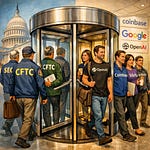IP, Identity, and the Blockchain Future
Live with Camp and Para Wallet
What does the future of digital identity and ownership look like? That’s what we tried to unpack in our latest livestream, where I was joined by Kyle, Nitya from Para Wallet, and Drew from Camp. We covered everything from cross-app wallets to AI-generated music, censorship resistance, the big picture for creators—and yes, we even connected it all back to cars and crypto.
Para Wallet: Sign In with Google, Stay Sovereign
Nitya kicked things off with Para’s mission: simplifying wallet onboarding for Web3. No seed phrases, no extensions. Just log in with email or Google and go.
But here’s the kicker—Para still stays non-custodial. They use two-party MPC (multi-party computation) to split control between the user and Para. You sign with a passkey; they hold a share. If you lose it? There's a recovery flow. You can eventually fully self-custody by claiming both shares. According to Nitya, it’s a progressive onboarding journey—not all or nothing.
My take? I’m skeptical by nature. I’ve been burned in crypto before. So when someone says “no seed phrase” and “censorship-resistant,” I dig in. And I did. Is it really censorship-resistant if someone can subpoena Para? She had an answer, but I’m not fully convinced—yet.
Camp: IP + AI + Blockchain
Then we turned to Drew and Camp. Their mission? Build a Layer 1 focused on IP attribution and AI model training. Basically, they want to tokenize everything from music to tweets to data streams. Think Taylor Swift meets ChatGPT—where creators don’t just get ripped off, they get paid.
Camp isn’t trying to judge what’s real IP—they’re just the infrastructure and marketplace. Remix, stack, and sell content, with revenue flowing back to original creators based on blockchain provenance.
One use case: a funny Twitter account tokenizes its feed. A new user can buy that IP, train an LLM on the tone, and generate tweets in that style. Wild.
Why Should Creators Care?
We went deep on this. Why not just use AWS or a legal contract? What does blockchain really solve?
Creators—from musicians to meme lords—are constantly getting screwed. With Camp and Para, your wallet becomes your persistent identity. You log into every app with it, carry your IP history, and claim royalties automatically. In theory.
As I said live: we’re at a fork in the road. Either we let Bezos or Musk own the platforms and control our digital lives—or we build decentralized tools to own our identity, data, and creations. This is the kind of infrastructure that gives us that choice.
Cars + Crypto? Yep.
I asked them what the intersection is. One answer: your car’s data—where you drive, how you brake, your routes—is valuable IP. You should own it, not Ford or Google Maps.
Kyle dropped a vision: biometric steering wheels recognizing you and auto-logging into your wallet. From Spotify to road mapping to payments, it all ties back to your Para wallet. Not Apple ID. Not Google. Yours.
Final Thoughts
There’s skepticism. There’s ambition. But both Camp and Para are building toward a Web3 vision that feels like where things were supposed to go before meme coins and royalty-free NFT markets hijacked the narrative.
Whether they pull it off—or get absorbed into Web2-style platforms—remains to be seen. But conversations like this matter. We need to talk utility again. We need to talk user ownership again.
Because crypto is a choice. And so far, not enough people are choosing wisely.
Market Talk
We wrapped with macro: rates likely holding, inflation pinching, BlackRock still buying Bitcoin. But retail? They’re absent. And that’s a concern.
I still think we’re in for a tougher summer than people expect.
My Take
The biggest question of the episode wasn’t technical. It was moral. Do we want to keep letting centralized platforms define our rights and own our data—or do we want to build a better system?
Camp and Para are trying to build that system. Whether they succeed or not, that’s the kind of Web3 I want to see more of.
Happy HODLing, Everyone.












